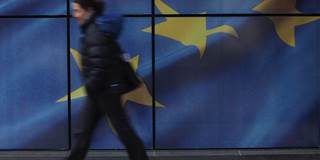Addressing the challenges Europe faces will demand the sustained implementation of smart, forward-looking policies, carried out by the EU’s core institutions. Yet, following a five-year period of unprecedented political fragmentation in the EU, the outlook for the functionality of these institutions appears grim.
MADRID – August is always a good time for taking stock. Between the rush of summer activity and the beginning of the new “school year,” this month’s lull offers a moment for reflection on where matters in Europe stand – and where they are headed. The European Union, and its headquarters in Brussels, is no exception, particularly ahead of a year of transitions. But amid speculation over the coming challenges and changes, the one new appointment that could make or break the EU over the next five years, that of the European Council president, has been completely overlooked.
Europe’s attention has been trained on three issues that pose a clear and imminent threat: Brexit, migration, and rising nationalism, which in countries like Poland is fueling growing resistance to the EU and the rule of law. How these issues are handled will affect the future and functionality of the EU. This is particularly true for Brexit, which – despite the gloom and doom hovering over the negotiations – seems likely to result in the two sides buying time with a transitional agreement that will create space for a permanent arrangement.
In any case, addressing these and other challenges will demand the sustained implementation of smart, forward-looking policies, carried out by the EU’s core institutions: the European Parliament, Commission, and Council. Yet, following a five-year period of unprecedented political fragmentation in the EU, the outlook for the functionality of these institutions appears grim.

MADRID – August is always a good time for taking stock. Between the rush of summer activity and the beginning of the new “school year,” this month’s lull offers a moment for reflection on where matters in Europe stand – and where they are headed. The European Union, and its headquarters in Brussels, is no exception, particularly ahead of a year of transitions. But amid speculation over the coming challenges and changes, the one new appointment that could make or break the EU over the next five years, that of the European Council president, has been completely overlooked.
Europe’s attention has been trained on three issues that pose a clear and imminent threat: Brexit, migration, and rising nationalism, which in countries like Poland is fueling growing resistance to the EU and the rule of law. How these issues are handled will affect the future and functionality of the EU. This is particularly true for Brexit, which – despite the gloom and doom hovering over the negotiations – seems likely to result in the two sides buying time with a transitional agreement that will create space for a permanent arrangement.
In any case, addressing these and other challenges will demand the sustained implementation of smart, forward-looking policies, carried out by the EU’s core institutions: the European Parliament, Commission, and Council. Yet, following a five-year period of unprecedented political fragmentation in the EU, the outlook for the functionality of these institutions appears grim.